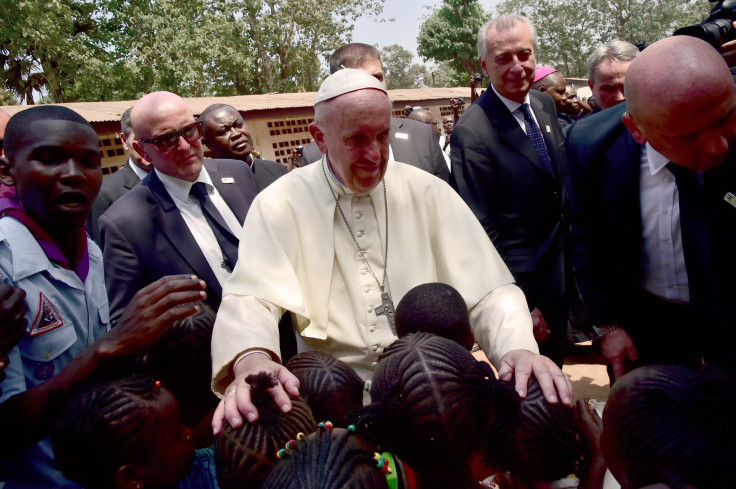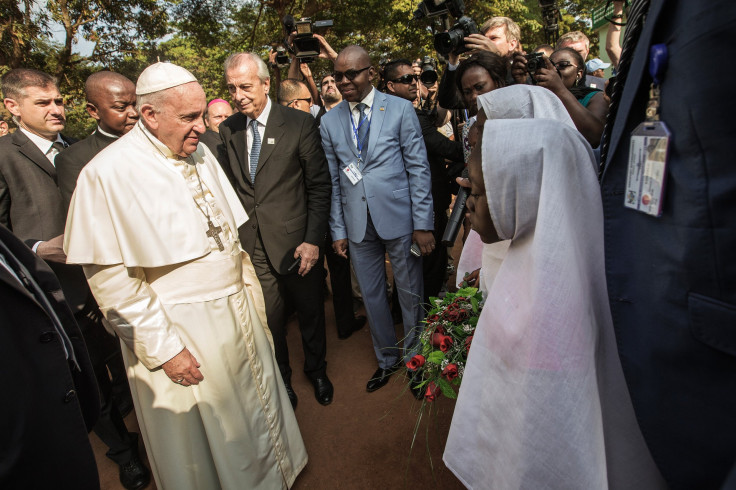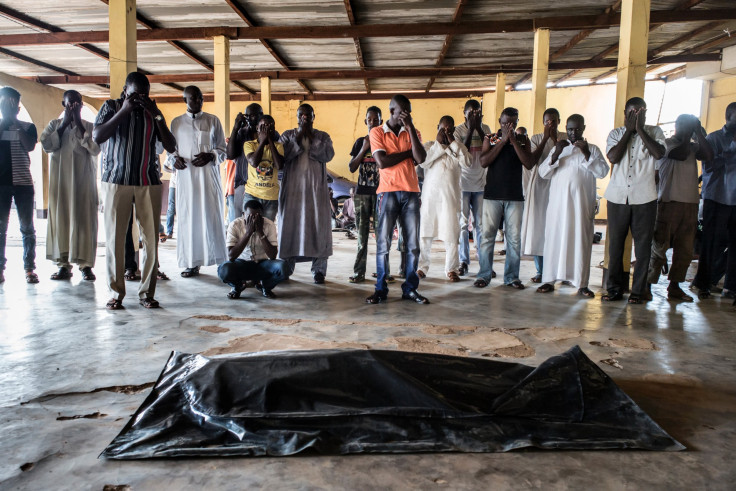After Pope Francis Visit, Central African Republic Labels Muslim Rebel Leader 'Enemy Number One' As Christian Majority Nation Returns To Turmoil

The papal ardor in Central African Republic seems to have come and gone almost as quickly as Pope Francis' recent visit to the war-torn country. Less than a week after the pontiff’s 26-hour stay there, during which he called for peace between the nation's Muslims and Christians, the transitional government Sunday labeled a leader of a mainly Muslim rebel group “Enemy No. 1.” While it was not immediately clear whether the administration's declaration would go beyond just rhetoric, the move marked the restoration of political turmoil and underscored just how little the pope's words resonated with the warring sides.
"Unfortunately, this does not bode well for the Central African Republic, and it does signal, as feared, a rapid return to normal after the pomp and goodwill that attended the papal visit,” said Ebenezer Obadare, associate professor of sociology who focuses on Africa at the University of Kansas' main campus in Lawrence. “Of course I am disappointed, but not surprised at all."
Central African Republic has been enmeshed in a deadly conflict since late 2012, when mainly Muslim groups formed an alliance known as Seleka and seized power in a coup from then-President Francois Bozize. The Seleka eventually ceded power amid international pressure to form a transitional government, which is tasked with steering the nation to elections slated for late December. However, the conflict opened a security vacuum and triggered the current wave of revenge attacks by Christian militias, leading to a vicious tit-for-tat cycle of sectarian violence. Some 400,000 people have been forced to flee their homes in Seleka-controlled areas, while another 460,000 have sought refuge in neighboring countries. Despite the sparring sides signing a cease-fire in 2014, violent clashes persist.
The bloodletting, however, did not deter Pope Francis from visiting the Christian-majority country starting Nov. 29 in the final leg of his three-nation, six-day tour of Africa, which also included Kenya and Uganda. Making international headlines as the first sitting pope to travel to an active warzone, Pope Francis met with religious and civic leaders in the last remaining Muslim community in the capital city of Bangui. Christian militias there have cut off the tiny PK5 neighborhood, one of the most dangerous districts in the city, from the rest of Bangui for the past few months by blocking supplies from entering and Muslims from leaving. Religious contentiousness aside, Christians and Muslims in the city welcomed the pope's visit and managed to maintain the fragile cease-fire while he was there.

The pontiff made one last appeal for peace Nov. 30 before leaving Bangui for Rome, calling for “an end to every act which, from whatever side, disfigures the face of God and whose ultimate aim is to defend particular interest by any and all means.” His words were echoed by local religious leaders in the capital city trying to foster a peace process but did little more in the days after his departure. Seleka rebels killed eight civilians and wounded a U.N. peacekeeper Dec. 3 at a camp for displaced persons in Ngakobo village near the central town of Bambari , located about 235 miles north of Bangui, the Associated Press reported.
Ex-Seleka rebel leader Nourredine Adam said Sunday on private radio station Ndeke Luka that he would not allow elections scheduled for Dec. 27 to take place in the regions under his control, where underdevelopment had pushed him and his group over the edge.
"[In the north and east] there are no hospitals, no schools, no roads. That's what led us to take up arms," said Adam, head of the Popular Front for the Renaissance of Central Africa, a splinter faction of the former Seleka rebel group. "If they want to send in doctors or teachers, they will be welcome. But any other type of government worker we will not accept. Carrying out a vote in the current climate is not possible.”
The transitional government dubbed Adam its top enemy, saying in a statement Sunday his threat to block the upcoming elections, along with his lack of respect for cease-fires and peace agreements, amounted to acts of war, Reuters reported. The response may further muddle the chances that militias will agree to lay down their weapons, which, in addition to Adam's declaration, will make a peaceful, nationwide vote this month even more unlikely.

David Cook, associate professor of religious studies at Rice University in Houston, said Pope Francis’ visit focused on the displaced Muslim population in the flashpoint capital who have been mainly victims -- not perpetrators -- of the sectarian violence. The pontiff’s calls for peace apparently did not reach the Muslim rebels outside the southern city, who have actively contributed to the revenge attacks.
“It doesn’t necessarily reflect that the pope’s call has been futile. But it does highlight the differences between the various Muslim groups,” Cook said. “The Muslims in Bangui have been besieged for the last year and a half; they’re looking for anyone to help them out. Whereas the Seleka in the north, there’s not much the government or the pope can offer them.”
Pope Francis failed to unite the warring sides and renew dialogue during his fleeting visit to Central African Republic, where 80 percent of the population is Christian and roughly 15 percent is Muslim. However, these are tasks outside his papal powers, Obadare, of the University of Kansas, said.
“Pope Francis is in no way to blame for this,” he insisted. “If anything, what we have here is a telling reminder of the limits of good intentions, in particular interventions that do not address the long-standing political and socioeconomic roots of conflicts, whether in Africa or any other part of the world.”
© Copyright IBTimes 2025. All rights reserved.




















